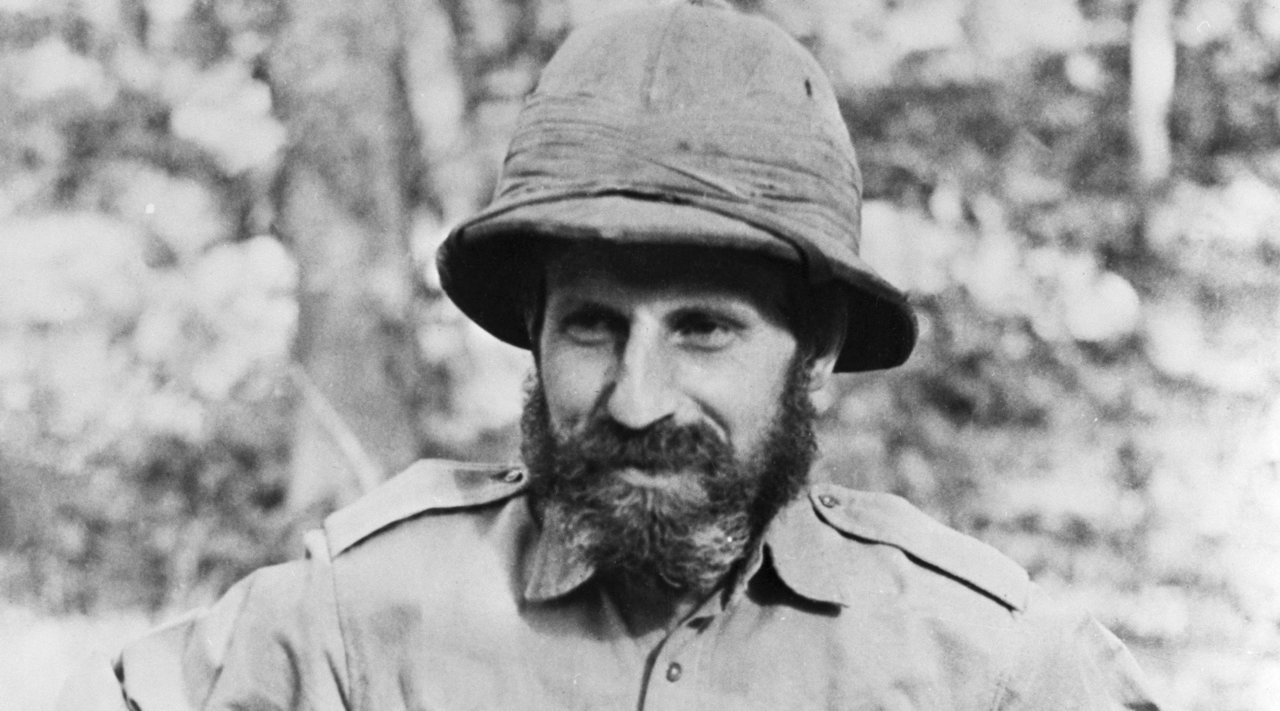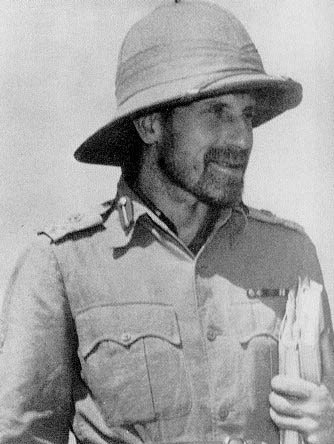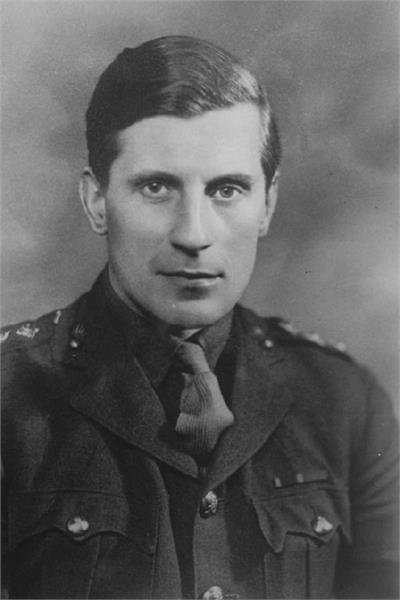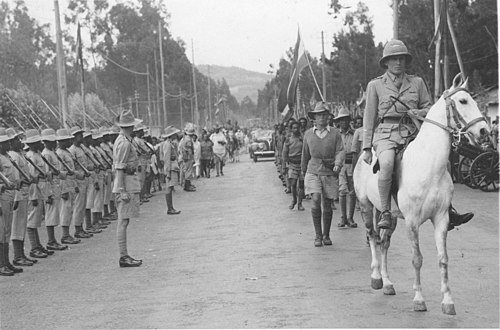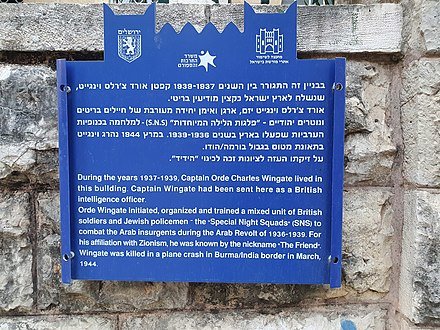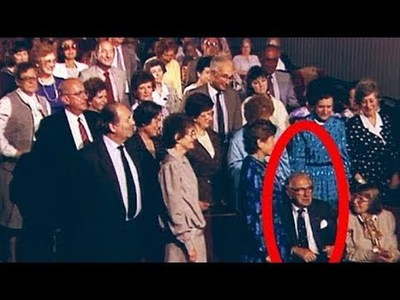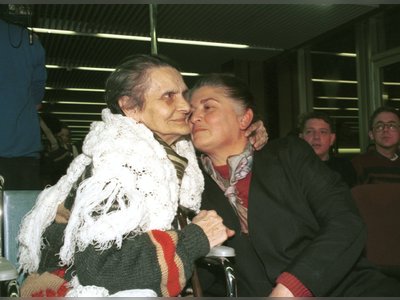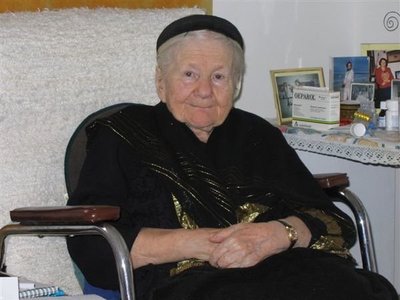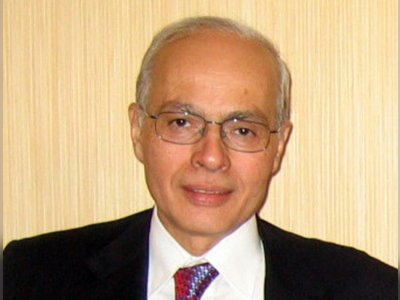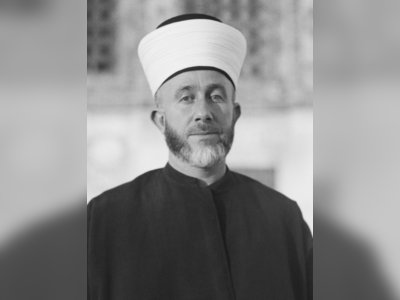Orde Charles Wingate: The Unconventional Military Leader and Zionist Pioneer
Orde Charles Wingate, born on February 26, 1903, and tragically perishing on March 24, 1944, was a British military officer who specialized in guerrilla warfare and held fervent Zionist beliefs.
During his service in the British Army in Palestine, Wingate initiated the establishment of special night squads within the Haganah organization in 1938, in response to the Great Arab Revolt, earning him the moniker "HaYedid" (The Friend). In World War II, he served in Africa and Asia, ultimately losing his life in a plane crash in India, holding the rank of Major General (equivalent to Brigadier).
Biography
Wingate was born in Naini Tal, located in British-ruled northern India during that era. His family, of Scottish descent, belonged to the Exclusive Brethren Christian sect, which had severed ties with the Anglican Church in the 17th century. He was named Orde after his mother's maiden name, which was related to the Ord-Brown family.
His father, who was 51 at the time of his birth, served in the Royal Artillery, and Wingate received a non-conformist Christian upbringing with strong religious and pro-Zionist values from an early age. Due to his non-conformist background, he was exempt from participating in prayers during his school days at the prestigious Charterhouse private school.
In 1921, Wingate was admitted to the Royal Military Academy in Woolwich, London, which specialized in training artillery and engineering officers. In 1923, he was commissioned as a Second Lieutenant. He learned Arabic at the School of Oriental Studies in London and was sent to Sudan in 1928 with the assistance of his family, particularly his cousin Reginald Wingate, who had served as the Governor-General of Sudan. A year earlier, he had privately scouted Sudan during a vacation taken for this purpose.
Wingate served in the Sudanese Army and engaged in capturing smugglers and poachers along the Ethiopian border. He transformed the mode of operation from routine patrols to ambushes.
In 1933, upon completing his service in Sudan, he embarked on an expedition in the Libyan desert to search for the lost army of the Second Punic War general, Hannibal, and the legendary Zerzura oasis. Since this mission yielded no significant findings, he returned to Britain and was assigned to the Royal Artillery.
In 1935, he married Lorna Patterson, who was 18 at the time. In September 1936, he was sent to Palestine in an intelligence officer role. His wife joined him in Palestine.
Upon his arrival in Palestine, Wingate served as an intelligence officer in the 5th Division in Haifa, holding the rank of Captain. After the suppression of the initial phase of the Arab Revolt in October 1936, he transferred to the Intelligence Branch (I Branch) of the General Staff of the British Army in Jerusalem. During this period, Wingate collected intelligence from Arabic and Hebrew newspapers, translated it into English, and built a database on prominent figures in the region.
In the course of his duties, Wingate established relationships with senior members of the local Jewish leadership and the intelligence apparatus of the Haganah, including figures like Haim Weizmann, Moshe Sharett, Yochanan Ratner, David Cohen, Emanuel Wilszanski, Reuven Shiloah, and others. Wingate openly identified as a Zionist, believing in the Jews' right to establish an independent state in Israel.
He even drafted a proposal for Weizmann regarding the establishment of a Jewish army in the future Jewish state, following the recommendations of the Peel Commission. Due to his strong Zionist sympathies, he became known as "HaYedid Shelcha" (Your Friend), a code name given to him by Shiloah, which was widely recognized throughout the Jewish community.
During March and April of 1938, Wingate conducted reconnaissance missions in the Galilee and the Jezreel Valley to assess methods of preventing the smuggling of arms and fighters into the country by Arab irregulars. During these operations, he collaborated with Jewish settlers and established connections with the local Jewish leadership. As a result of these missions, Wingate founded the Special Night Squads (SNS) in June 1938.
The SNS consisted of about 40 British soldiers and approximately 75 Jewish volunteers from the Haganah. During this period, Wingate lived on Kibbutz Ein Harod. Wingate developed an innovative operational concept for the unit, emphasizing precise intelligence, tactics, and covert operations. The unit operated for a total of six months under his command, with only four of those months spent actively in the field.
Despite its short existence, the SNS achieved remarkable operational success, accounting for 17% of all Arab irregular losses during that time across the country. Wingate himself was promoted to the rank of Major (equivalent to a Lieutenant Colonel) in recognition of these achievements and was awarded the Distinguished Service Order, the second-highest military decoration in the British Empire.
In October 1938, Wingate returned to England. During his stay in the UK, he met with prominent figures in the British political establishment, including Secretary of State for War Malcolm MacDonald, Member of Parliament Winston Churchill, and Lord Beaverbrook, a media magnate. In these meetings, Wingate attempted to persuade his interlocutors to adopt a pro-Zionist policy for the British government and to fend off Arab demands.
These encounters, however, drew criticism from his superiors, leading to his removal from command of the SNS and, eventually, his expulsion from Palestine. In May 1939, the British War Office ordered Wingate to return to England, deeming his pro-Zionist stance a threat to the British crown.
Despite his removal from Palestine, Wingate continued to advocate for the establishment of a Jewish army in Palestine when World War II broke out in 1939. He was stationed in Sudan, where he created the Gideon Force, composed of British, Sudanese, Ethiopian, and some veteran Haganah fighters.
The unit began operations in February 1941, targeting Italian forces in Ethiopia as part of the East African campaign. Wingate was promoted to Lieutenant Colonel and assumed command of the force, which consisted of around 1,700 fighters and took around 20,000 Italians as prisoners of war. In June 1941, Wingate returned to Cairo and fell ill with malaria.
Due to his weakened mental state, possibly exacerbated by medication for malaria, he attempted suicide by stabbing himself. After a period of recuperation in Britain, he was sent to India.
In February 1942, Wingate was promoted to the rank of Colonel and established a guerrilla unit that operated in Burma. After the Japanese occupation of Burma, he returned to India and was appointed as the commander of the Chindits, an elite infantry division he had developed.
Despite numerical disadvantages, the Chindits conducted their first major operation on February 8, 1943, when 3,000 British soldiers crossed the Chindwin River into Burma to disrupt a key railway line. Although the mission was considered relatively successful after the railway line was severed, it met fierce Japanese resistance.
After grueling battles, fewer than 2,200 soldiers of the original force managed to return to India, and more than 900 were killed, captured, or missing in action.
Wingate's unconventional tactics and emphasis on long-range penetration behind enemy lines made him both admired and controversial. His strategies aimed at disrupting Japanese supply lines and creating havoc deep within enemy territory, but they also subjected his troops to harsh conditions and brutal combat. The Chindits' operations took a heavy toll on his forces, and the division was eventually disbanded in February 1944.
Tragically, on March 24, 1944, while on a reconnaissance flight in a U.S. Army Air Forces B-25 bomber over India, Wingate's plane crashed, killing him and all on board. He was 41 years old at the time of his death.
Legacy
Orde Wingate's legacy is multifaceted. He is remembered for his pioneering contributions to guerrilla warfare and unconventional military tactics, particularly his development of the Chindits. His belief in the importance of training and leadership in military operations left a lasting impact on special forces and unconventional warfare doctrine.
Wingate's strong pro-Zionist stance and his role in the establishment of the Special Night Squads in Palestine earned him enduring recognition and appreciation within the Israeli military and political sphere. He is celebrated as a "Friend of Zion" in Israel, with monuments and streets named in his honor.
Despite his often controversial methods and personal eccentricities, Orde Wingate remains a complex and influential figure in military history and the history of the Zionist movement. His commitment to the Zionist cause, his innovative military strategies, and his ultimate sacrifice in service to his country continue to shape perceptions of his life and work.
- אורד צ'ארלס וינגייטhe.wikipedia.org
